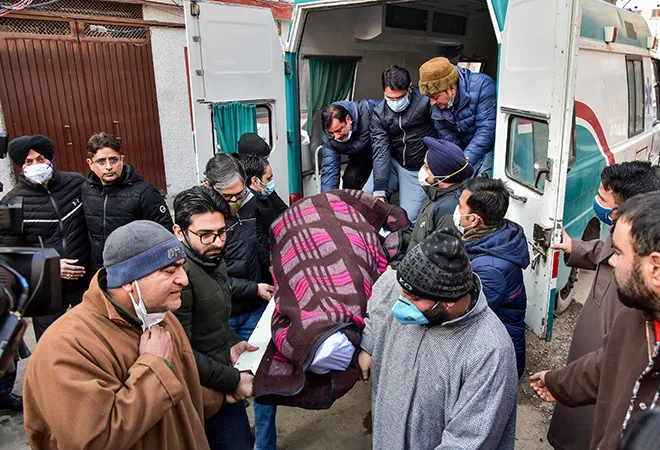
Hours before the end of Annus Horribilis, Satpal Nischal, a Punjabi businessman was murdered in the heart of Srinagar city. The targeted killing of Nischal is arguably a dangerous leitmotif of not only what awaits Kashmir in 2021; worse, it brings back nightmarish memories of the targeting of minorities nearly three decades ago that led to an exodus of Kashmiri Pandits and the start of a spiral of violence that hasn’t ended since. The Nischal murder, therefore, has cast a pall of gloom over the new year.
Initial reports suggested the killing was carried out by “unidentified assailants.” But soon the newly formed militant outfit, The Resistance Front, claimed responsibility for the attack in a short statement issued on its Telegram channel. The statement linked the killing of Nischal to the new Domicile Law implemented by the Government of India in the year 2020. The statement read: “Domicile certificate is unacceptable and they shall be treated as occupiers. Nischal Jewellers was one of such stooges. More to come. #TRF.”
Hours later, the militant outfit released a longer statement followed by a picture of the business establishment, Nischal Jewelers, in the centrally located business avenue of Srinagar. The picture was superimposed with text that read: “Domicile Fraudlants. We know your names, where you live, what you do. We are coming.”
The new year’s eve killing makes it evident that militant groups have now trained their gun on individuals who have sought the domicile of Jammu and Kashmir.
In its second statement, TRF claimed that the attack on the businessman was, “an intelligence-based operation” and alleged that the murdered man was “an active participant in the Demographic change and Settler Colony Project run by Hindutva fascists to alter the demography of Kashmir.” The statement further added that any individual who seeks the domicile of Jammu and Kashmir will be treated as an RSS agent, suggesting more targeted killings will be carried in days to come.
Ten days before the killing of Nischal, another newly formed militant outfit, People’s Anti-Fascist Front, had issued threats to “outsiders” saying they will not be allowed to settle in J&K.
A report published by The Times of India confirmed that Nischal had recently acquired the domicile of Jammu and Kashmir after living there for 40 years. Originally from Amritsar in Punjab, Nischal has recently purchased a shop and a residential house in Srinagar. His killing is a first such attack on a new domicile holder.
The new year’s eve killing makes it evident that militant groups have now trained their gun on individuals who have sought the domicile of Jammu and Kashmir. This new factor complicates the already complex security dynamics of the region. Last year, militant outfits shifted to guerrilla tactics by carrying out standoff attacks on members of security forces and civilians, particularly the cadre of the Bhartiya Janata Party (BJP).
Even though the killing did not get much media attention as is usually the case for events occurring in Jammu and Kashmir, the politicisation of this killing is an inevitable outcome.
The Jammu and Kashmir police have had their hands full due to the renewed threats on political workers. Its security wing, which oversees the protection of vulnerable individuals and political leaders, is already stretched beyond limits. Last year, the police had to whisk away
panches,
sarpanches and members of the BJP to hotels for protection. With the killing of the Srinagar businessman, the demands for security cover are going to increase manifold and thus the protection of individuals will become even more difficult.
Nishcal’s killing has drawn a spotlight on the much-criticised domicile law, which has faced opposition from a cross-section of the society in Jammu and Kashmir, including the mainstream parties. The regional parties such as the NC and PDP had issued statements against the law
claiming the law was aimed at changing the demography of the Union Territory. Even in the Jammu region,
protests had erupted after the new law was issued.
Nischal’s killing makes the stand of political parties who opposed the new domicile law weaker. Even though the killing did not get much media attention as is usually the case for events occurring in Jammu and Kashmir, the politicisation of this killing is an inevitable outcome. Although political parties across the spectrum have condemned the killing, the BJP will seek to put them in the dock by equating their demands to the narrative of militant outfits and separatist groups against the domicile law.
No doubt a new wave of communal polarisation is set to be unleashed on Jammu and Kashmir.
The militant outfits, separatist groups and secessionist intelligentsia term the new domicile law as a “settler-colonial” project aimed at changing the demography of the region. Here they share something in common with the mainstream parties who have also raised a hue and cry on demographic change.
No doubt a new wave of communal polarisation is set to be unleashed on Jammu and Kashmir. The Srinagar killing will have an adverse reaction in the rest of the country as well and will put Kashmiri traders, students and families living outside J&K at risk of reprisal attacks as was witnessed in the aftermath of the Pulwama suicide attack.
That the killing happened in the heart of Srinagar and the social media propaganda that followed has already unleashed a wave of terror among the beneficiaries of the new domicile policy of J&K, while reviving memories of targeted killings of the 1990s that led to the exodus of Kashmiri Pandits.
For the BJP, any sign of backtracking on the domicile policy will have negative repercussions in its core Hindu-nationalist constituency. Thus, the political leadership in Delhi will surely double down on its support for the domicile policy. That leaves the individuals who recently acquired the domicile status of Jammu and Kashmir even more vulnerable. The security establishment will have to brace itself for the upcoming challenges and devise a strategy to deal with the emerging threat in a communally charged atmosphere. For Jammu and Kashmir and its people, the new year has arrived with another spell of darkness.
The views expressed above belong to the author(s). ORF research and analyses now available on Telegram! Click here to access our curated content — blogs, longforms and interviews.



 Hours before the end of Annus Horribilis, Satpal Nischal, a Punjabi businessman was murdered in the heart of Srinagar city. The targeted killing of Nischal is arguably a dangerous leitmotif of not only what awaits Kashmir in 2021; worse, it brings back nightmarish memories of the targeting of minorities nearly three decades ago that led to an exodus of Kashmiri Pandits and the start of a spiral of violence that hasn’t ended since. The Nischal murder, therefore, has cast a pall of gloom over the new year.
Initial reports suggested the killing was carried out by “unidentified assailants.” But soon the newly formed militant outfit, The Resistance Front, claimed responsibility for the attack in a short statement issued on its Telegram channel. The statement linked the killing of Nischal to the new Domicile Law implemented by the Government of India in the year 2020. The statement read: “Domicile certificate is unacceptable and they shall be treated as occupiers. Nischal Jewellers was one of such stooges. More to come. #TRF.”
Hours later, the militant outfit released a longer statement followed by a picture of the business establishment, Nischal Jewelers, in the centrally located business avenue of Srinagar. The picture was superimposed with text that read: “Domicile Fraudlants. We know your names, where you live, what you do. We are coming.”
Hours before the end of Annus Horribilis, Satpal Nischal, a Punjabi businessman was murdered in the heart of Srinagar city. The targeted killing of Nischal is arguably a dangerous leitmotif of not only what awaits Kashmir in 2021; worse, it brings back nightmarish memories of the targeting of minorities nearly three decades ago that led to an exodus of Kashmiri Pandits and the start of a spiral of violence that hasn’t ended since. The Nischal murder, therefore, has cast a pall of gloom over the new year.
Initial reports suggested the killing was carried out by “unidentified assailants.” But soon the newly formed militant outfit, The Resistance Front, claimed responsibility for the attack in a short statement issued on its Telegram channel. The statement linked the killing of Nischal to the new Domicile Law implemented by the Government of India in the year 2020. The statement read: “Domicile certificate is unacceptable and they shall be treated as occupiers. Nischal Jewellers was one of such stooges. More to come. #TRF.”
Hours later, the militant outfit released a longer statement followed by a picture of the business establishment, Nischal Jewelers, in the centrally located business avenue of Srinagar. The picture was superimposed with text that read: “Domicile Fraudlants. We know your names, where you live, what you do. We are coming.”
 PREV
PREV


